OpEd: HEMEXPO Brings Impetus to Shipping’s Collaborative Agenda
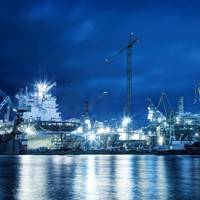
HEMEXPO President, Helen Polychronopoulou, says Greek marine technology developers see collaboration between shipping industry stakeholders as the key to innovation and decarbonization.Helen Polychronopoulou has dedicated her career to the successful growth and development of the marine equipment manufacturing industry in Greece and today leads HEMEXPO – Hellenic Marine Equipment Manufacturers and Exporters.Established in 2014, HEMEXPO has developed a pivotal role in representing Greek marine technology specialists by reinforcing links worldwide with ship owners and operators…
Voices: Paulo Cesar P. Freitas, Norsul
To better understand the challenges faced by ship operators in Brazil, Maritime Reporter’s correspondent in Brazil spoke to Paulo Cesar P. Freitas, Fleet Manager for Norsul Shipping company, one of the major shipping operators in Brazil. Established in 1963 and operating continuously ever since, “Companhia de Navegação Norsul”, as it is called in Portuguese, is one of the leading private maritime commerce companies in Brazil. Norsul specializes in dry-bulk, neo-bulk cargoes, general cargo, project cargoes, along with chemicals and liquid cargoes, operating in the Brazilian Cabotage and international shipping markets. Freitas has worked for Norsul for 28 years, starting as Ship Superintendent and today operating as Fleet Manager.
Sailing Ships: Ship of the Future?
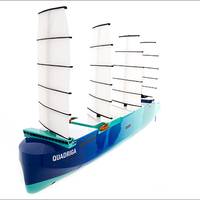
For as long as there has been a need to transport cargo there has been a maritime industry. Throughout that history both owners and mariners have worked to devise ways of saving costs, making faster transits, and carrying more cargo. In 1819 the Steam Ship Savannah made maritime history by being the first steamship to cross the Atlantic Ocean, sounding eight bells for the traditional cargo carrying tall ship. Although that eight bell sounded for quite some time, the future of shipping arrived with Savannah. In 1911 M.S.
BWMS: What does it mean for onboard operations?
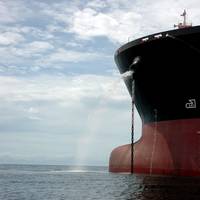
As of September 8, 2016 the Ballast Water Convention officially was ratified by the International Maritime Organization (IMO), crossing the necessary threshold of 35% of world tonnage signed on courtesy of the ratification by Finland. Subsequently, at press time, the United States Coast Guard was moving rapidly to confirm type approval of BWMS systems, to date confirming the approval of three systems from Alfa Laval, Oceansaver and Optimarin. In this edition we delve into the Ballast Water Convention, United States Coast Guard Regulations, and what this all means as far as onboard operations.
Europort Tackles Shipping’s big issues
Shipping’s data revolution, its environmental responsibilities and its continuing reliance on ‘the human factor’ will be the focus of attention as the eyes of the maritime world turn once more to Rotterdam between 7th-10th November 2017, for the staging of the long-established, and always well-supported Europort event. Organised by Rotterdam Ahoy, Europort is the highlight of the maritime exhibition calendar in 2017, with a finely crafted programme expected to attract an estimated 30,000 visitors and 1,100 exhibitors. The Europort exhibition team has chosen three highly topical themes for the event this year. These are: Big Data; The New Environmental Age; and The Human Factor.
Ballast Water Tech Business Gearing for a Surge in ‘16
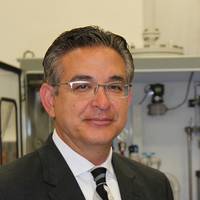
While the trek to see the ballast water technology market ‘really take off’ has stretched more than a decade longer than he anticipated, Ecochlor’s president Tom Perlich has maintained course and is ready to grow in rapid step with the market. When Tom Perlich left Corporate America in 2001 to start Ecochlor, he left behind the security of a major corporation and all of its benefits, just one month after the birth of his fourth child. Why? He saw the vast potential of the global Ballast Water Technology (BWT) market, which at the time he assessed it would really take off in just six months.
Ballast Water Technology Installation & Innovative Drive Contols
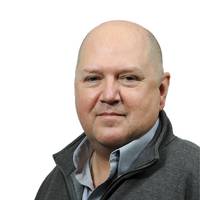
Specifying for ballast water treatment systems can be a difficult process. Ian Hamilton, sales manager for marine electrical wiring control and instrumentation specialists CMR Group, offers guidance. Ballast water, which is used to maintain balance and stability when a ship is empty of cargo, has been identified as a key factor responsible for bringing invasive species of microorganisms into non-indigenous environments, causing a major threat to marine ecosystems. All ships in…
USCG Adm. Zukunft: The Man, His Mission
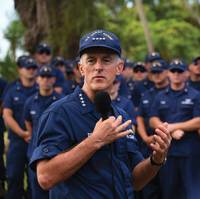
Adm. Paul F. Zukunft, the 25th commandant of the U.S. Coast Guard has a full plate. Driving sexual assault out of the Coast Guard; Preparing the fleet for operations through the year 2061; Coordinating intel and assets to stem the flow of illegal drugs ... they are all on the short list. From his Washington, DC, HQ he shares his vision and mission with Maritime Reporter. You are almost a year in this position as the Commandant of the United States Coast Guard. Looking back, critique year one.
Editorial: The MAN in Command
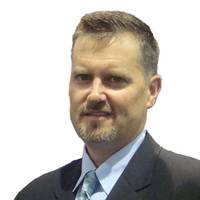
I had never personally met with U.S. Coast Guard Commandant Admiral Paul Zukunft before I sat with him in his office at Coast Guard headquarters in Washington, D.C., last month, but having sat with a long list of government, military and corporate leaders in my time, my expectations were someone who was confident, focused and, well, commanding. He’s all that and more, but what I did not expect was that the Commandant would be faster than I to the Tweet! (I rationalize by telling myself that his Public Affairs staff offers a quick hand in this regard).
Ballast Water Leadership
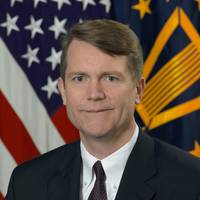
Admiral Paul Zukunft, the new U.S. Coast Guard Commandant, could fill the BWT leadership void. Global efforts to combat the spread of invasive species in ballast water are hampered by a leadership void so serious that in April the International Chamber of Shipping (ICS) discouraged further ratifications of the International Maritime Organization’s (IMO) invasive species convention. Admiral Paul Zukunft, the new U.S. Coast Guard Commandant, could fill that void and get those efforts onto the right track. The United States has been blessed with strong Coast Guard Commandants.
USCG
ADM Bob Papp’s Coast Guard tenure continues to be one of low profile victories, calm leadership and an emphasis on doing what is right for the Coast Guard. U.S. Coast Guard Commandant Adm. Bob Papp delivered the 2013 State of the Coast Guard (SOCG) Address at the National Defense University at Fort Lesley J. McNair in Washington, D.C. on February 27. Adm. Papp assumed command of the Coast Guard in May of 2010, he had the unenviable task of following perhaps the most charismatic leader the Coast Guard has ever had. The high profile Thad Allen, dubbed by the mainstream media as “the rock star” Commandant, also more earned his reputation by firm leadership over the course of more than one highly visible crisis after another.
Retlif To Help Test Ballast Water Technology

Retlif Testing Laboratories is part of a partnership to evaluate and test technologies designed to treat ballast water on board ships against non-native aquatic species in American coastal waters, lakes and rivers. The U.S. Coast Guard developed regulations to limit the release of live organisms and to reduce the risks associated with the spread of aquatic invasive species. Ballast water management system manufacturers (BWMS) will apply to NSF International and the U.S. Coast Guard for testing, review and evaluations.
Coldharbour Marine Joins IMarEST Marine Partner Scheme
Coldharbour Marine Ltd., UK-based marine inert gas and ballast water treatment specialists, has joined the Institute of Marine Engineering, Science and Technology (IMarEST) Marine Partner scheme as a Marine Affiliate, able to draw on the numerous advantages of corporate partnership with IMarEST, a professional body for the global marine community. “We are delighted to welcome Coldharbour Marine as Marine Affiliates, which offers them a package of services, employee engagement, professional development opportunities, networking, technical support and information opportunities, providing them with a platform to demonstrate their strong commitment to developing employee skills,” said IMarEST’s Chief Executive, David Loosley.
AGLPA Responds to BWT Research Findings

Steven A. Fisher, Executive Director of the American Great Lakes Ports Association takes issue with the findings of a Notre Dame Ballast Water Technology research paper. In recent years, a debate has raged between the maritime industry and environmental activists regarding the appropriate regulation of ships' ballast water. This public policy discussion has unfortunately been tainted by considerable misinformation. Such misinformation fuels "issue hysteria" and leads to poorly crafted regulations.
Big Ideas Sometimes Come in Small Packages
Hyde Marine’s chemical-free, IMO Type Approved ballast water treatment solution packs performance in a smaller footprint. That’s good news for small vessel operators who may soon find themselves impacted by a problem that previously was thought to be a “bluewater” issue. The notion that ballast water treatment and invasive species are both strictly the domain of big, bluewater liners coming from the Far East and other exotic locales quickly went out the porthole last November when the Environmental Protection Agency (EPA) issued its long-awaited, updated draft Vessel General Permit (VGP) rule. The new rules potentially bring regulations to bear on vessels as small as 79 feet LOA and others, depending on service and routing.
Canada Ramps up Pressure on NY over BWT
Yesterday’s well-attended ballast water policy teleconference briefing by the Canadian Minister of Transport served notice that Canada has no intention of allowing the state of New York to dictate ballast water regulations, nor impede commerce on the St. Laurence Seaway. The message delivered by Canada’s Parliamentary Secretary to the Minister of Transport, Infrastructure and Communities and for the Federal Economic Development Agency for Southern Ontario, Pierre Poilievre, was simple enough: we do not agree with the state of New York on ballast water issues and we will not allow our ocean commerce to suffer because of it. The teleconference, broadcast from Ottawa, provided a briefing on ballast water requirements on the St. Lawrence Seaway.
IMO to Resolve Crucial Issues this Week
In an action-packed week at its London headquarters last week, the International Maritime Organization’s Marine Environment Protection Committee (MEPC 52) literally moved mountains to get through a huge agenda packed with major issues which will shape the future of the tanker industry, including ballast water treatment guidelines, air emissions, reception facilities, PSSAs, ship recycling, MARPOL Annex II. Guidelines for the Approval of Ballast Water Management Systems were finalised and approved by the IMO with shipboard and laboratory trials now required as part of the approval process. This is contrary to previous approval procedures which traditionally relied on laboratory tests only.
Proposals Requested for Federal Ballast Water Demonstration Project
The U.S. Maritime Administration (MARAD), the National Oceanographic and Atmospheric Administration (NOAA), and the U.S. Fish and Wildlife Service are jointly requesting proposals for ballast water technology demonstration projects. Nearly $2.1 million, and/or the use of MARAD’s Ready Reserve Force ships as test platforms, will be made available for successful proposals. Interested parties may apply for funding, for use of a vessel, or both. Every day, large quantities of ballast water from areas all around the world are discharged from ships into the waters of the United States. In this ballast water are plants, animals, bacteria and pathogens that are not native to our nation’s ecosystems. Some of these organisms are microscopic; others may be large plants or free-swimming fish.
SOCP to Meet in Puerto Rico
The Ship Operations Cooperative Program (SOCP), sponsored by the Maritime Administration (MARAD), will meet in San Juan, Puerto Rico on June 22-24. Topics on the agenda include shipboard and port security plans; bridge technologies; mariner credentialing; and ballast water technology. For more information visit http://www.socp.org/main.shtml
BWT on Agenda for IMarEST
The introduction of non-native species via the discharge of ship’s ballast water is one of the main threats to marine biodiversity, with alien species often capable of out-competing native species – effective ballast water management (BWM) and the dissemination of good practice are thus essential throughout the marine community, which is why the Institute of Marine Engineering, Science and Technology (IMarEST) is the host of a BWM Special Interest Group, the Ballast Water Expert Group (BWEG). ‘Friends of BWEG’ include the International Maritime Organization’s GloBallast Partnerships Project, which is supporting the inaugural IMarEST Ballast Water Technology Conference, with its theme ‘Impending Convention Requirements and Challenges’.
NEI Treatment Systems Receives Ballast Water Management Certification
After many months of review and many years of testing, NEI Treatment Systems’ Venturi Oxygen StrippingTM (VOS) ballast water treatment system has been issued a Type Approval Certificate of Ballast Water Management System. The Certification was issued by the Liberian Register, with technical review by the American Bureau of Shipping (ABS). Land-based biological testing was conducted by the Chesapeake Biological Laboratory (CBL) of the University of Maryland Center for Environmental Science. U.S. Federal Government Laboratory. The testing was funded by the U.S. Atmospheric Administration (NOAA) as part of the U.S. Program. In 2004, the International Maritime Organization (IMO) finalized the International Convention for the Control and Management of Ships’ Ballast Water and Sediments…





